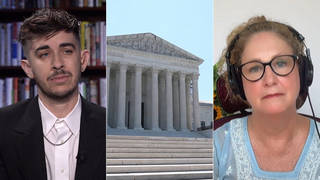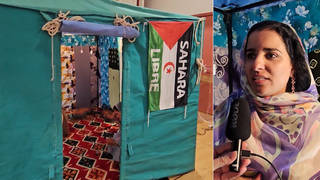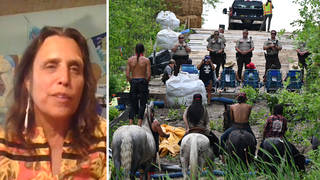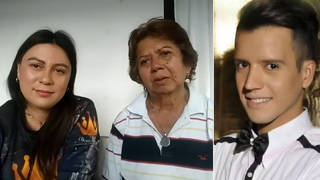
Guests
- Donna Chavissenior fossil fuel campaigner for Friends of the Earth and an elder of the Lumbee Nation.
Anti-pipeline activists are celebrating after Duke Energy and Dominion Energy announced they are dropping plans to build the Atlantic Coast Pipeline, a 600-mile pipeline that would have carried fracked gas from West Virginia to North Carolina and threatened rural Indigenous, Black and Brown communities. “There was an awful lot of opposition to this,” says Donna Chavis, senior fossil fuel campaigner for Friends of the Earth and an elder of the Lumbee Nation, whose territory the pipeline would have crossed. She says the communities that would have suffered “irreparable harm” from the pipeline “now have that cloud lifted from them.”
Transcript
AMY GOODMAN: This is Democracy Now! I’m Amy Goodman, with Juan González. We’re going now from Standing Rock to Appalachia, where anti-pipeline activists won another massive victory over the weekend when Duke and Dominion Energy said they had canceled plans to build the Atlantic Coast Pipeline, a 600-mile pipeline that would have carried fracked gas from West Virginia to North Carolina.
Indigenous leaders and environmental groups have opposed the pipeline since it was announced in 2014, saying it threatened rural Indigenous, Black and Brown communities. The pipeline’s planned route would have run through Union Hill, Virginia, a historically Black community founded by freed slaves after the Civil War, and Robeson County, North Carolina, home to the Lumbee Tribe.
The massive utility companies said lawsuits had increased costs for the pipeline by at least $3 billion, citing increased costs, ongoing delays and potential future legal battles as reasons for canceling the project.
Well, for more on the canceled Atlantic Coast Pipeline, we go to Pembroke, North Carolina, where we’re joined by Donna Chavis, senior fossil fuel campaigner for Friends of the Earth, elder of the Lumbee Nation. She has called the fight against the pipeline a “David versus Goliath” struggle.
Welcome to Democracy Now! Well, it looks like you have won this struggle, Donna Chavis. Can you respond to the decision and where you think it came from?
DONNA CHAVIS: Yes, and thank you for having me today, Amy. The decision is something that I was elated about. I was in a grocery store when I heard about it, and had to go outside to celebrate.
Where it came from? I think it came from a number of sources. Of course, we have Duke and Dominion’s answer, in that it became too expensive, and all of the delays caused by people on the ground forced them to pull out. And I would have to agree with them, in the sense that there was an awful lot of opposition to this.
What the decision means is that the environment, the communities that would have suffered irreparable harm and the Indigenous, Black and other peoples of color who would have been disproportionately impacted, had the pipeline been built, now have that cloud lifted from them.
I think that there were signs that this pipeline was not going to go anywhere. It was called the “pipeline to nowhere” at least two years ago, when all of the financial disarray related to the project began to become apparent.
JUAN GONZÁLEZ: And, Donna Chavis, what about the situation, the energy market situation worldwide, as oil has plummeted in price, fracked gas is no longer seen as a good investment by energy companies? Do you think that, combined with the public pressure and the lawsuits, had something to do with it, as well?
DONNA CHAVIS: Absolutely. In fact, Friends of the Earth, over the last 18 months, released no less than three reports that showed the risk of investing in this project, and not just this project, but fossil fuels, in general. Gas and oil are no longer the cheapest source for energy. And I know that, at least in North Carolina, decisions are supposed to be made about what is the best product for the citizens. And in this case, gas and oil is not the best. As you just pointed out, the price for both of those has just plummeted.
In the United States, we have a glut. We have a glut of both gas and oil. So, even though it was said that it was going to be used in North Carolina, in my case, it was clear that this was going to be for export. So, there were so many factors that were involved with the calamity that happened — to the companies, anyway. They see it as a calamity.
AMY GOODMAN: In 2017, Unicorn Riot interviewed John Laury, a lifelong resident of Union Hill, the historic Black community founded by the descendants of freed enslaved people in [un]incorporated Buckingham County, Virginia. Residents of Union Hill for years spoke out against the Atlantic Coast Pipeline, which would have cut right through Union Hill. This is what he said.
JOHN LAURY: We are in the zero zone. In other words, we are first to go. We know that it will emit poisonous gases. We know that. And we know that it will definitely contaminate the water. We are now just recently beginning to find slave cemeteries. This community is perhaps 85% Black. Perhaps that’s why they say this area has no culture or natural resource, which is both lies.
AMY GOODMAN: So, that’s John Laury, lifelong resident of Union Hill. If you could, Donna Chavis, talk about the solidarity between Indigenous people, the African American community, as well, what this solidarity meant in defeating the pipelines — the pipeline?
DONNA CHAVIS: This solidarity was absolutely necessary. Early on, we began to say that we were in sacrifice zones. I relate totally to everything that Mr. Laury said, because, in so many cases, the communities, the Black communities, the Indigenous communities, are sometimes officially declared sacrifice zones. And so, as we were working up and down the pipeline in resistance and opposition, we found ourselves in a wonderful situation of crossing the boundaries between race and class, and bringing together the Indigenous and African American communities.
I’ll give you one example. Northampton County, which is what I call — used to call the northern gate of the pipeline coming into North Carolina, it is a majority-Black community. And then you have Robeson County, that is a majority-Native American and Black community together. So, along the pipeline route, we were joining together the northern gate and the southern gate, and all those in between, to work against this substantial problem that we were facing. And we held each other up and kept going, until we were on the phone Sunday calling and texting and emailing all over the place with celebration.
JUAN GONZÁLEZ: And, Donna Chavis, we have only about a minute or so left, but I was wondering if you could tell us a little bit about the Friends — Friends of the Earth is turning its attention now to a gas storage facility in North Carolina that Piedmont Natural Gas, a subsidiary of Duke Energy, is planning to develop. Could you tell us briefly what that project is about?
DONNA CHAVIS: Yes, it is a Duke Energy project through Piedmont Natural Gas, which is a wholly owned subsidiary. It will be a 1-billion-cubic-foot storage and distribution facility. And it is sitting smack dab in the middle of a majority-Indigenous community, Lumbee and Tuscarora, very close to a school, just barely within the limits of the one mile that would have stopped it from being able to be built. The impact has already been shown, in the sense that there’s been clearcutting of all the forest that’s there. There has been some flooding, with all the rains we still have. We were hit very badly with Florence, and that particular spot was flooded most of the time during the storm and for quite a while afterwards. So, we had been already paying attention to that project, and now we will just be able to put even more of our resources into approaching and assisting the community in its opposition.
AMY GOODMAN: Well, Donna Chavis, we want to thank you for being with us, senior fossil fuel campaigner for Friends of the Earth and an elder of the Lumbee Nation, Friends of the Earth, speaking to us from Pembroke, North Carolina.
This is Democracy Now! When we come back, we go inside Otay Mesa Detention Center, the jail near San Diego. Stay with us.













Media Options